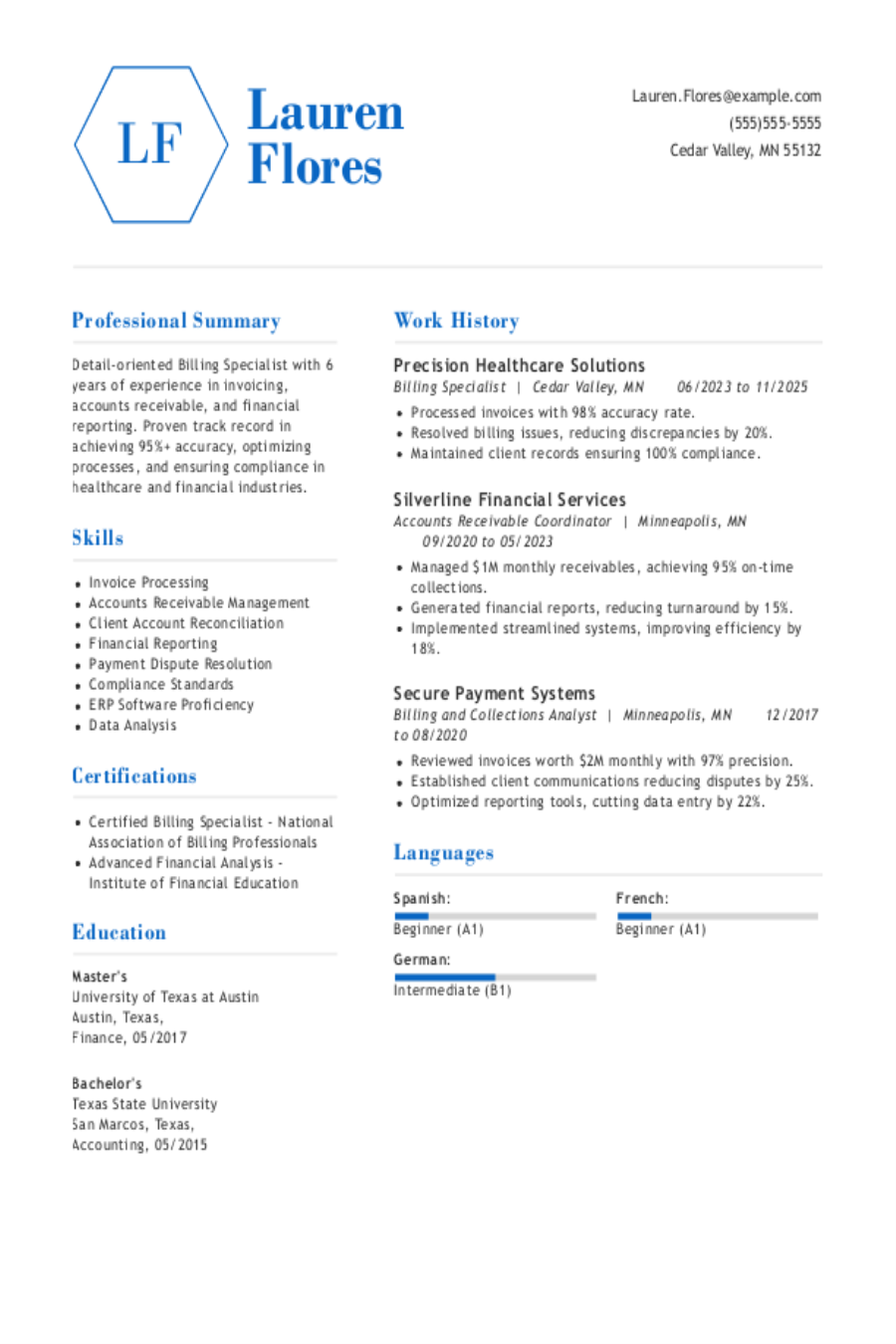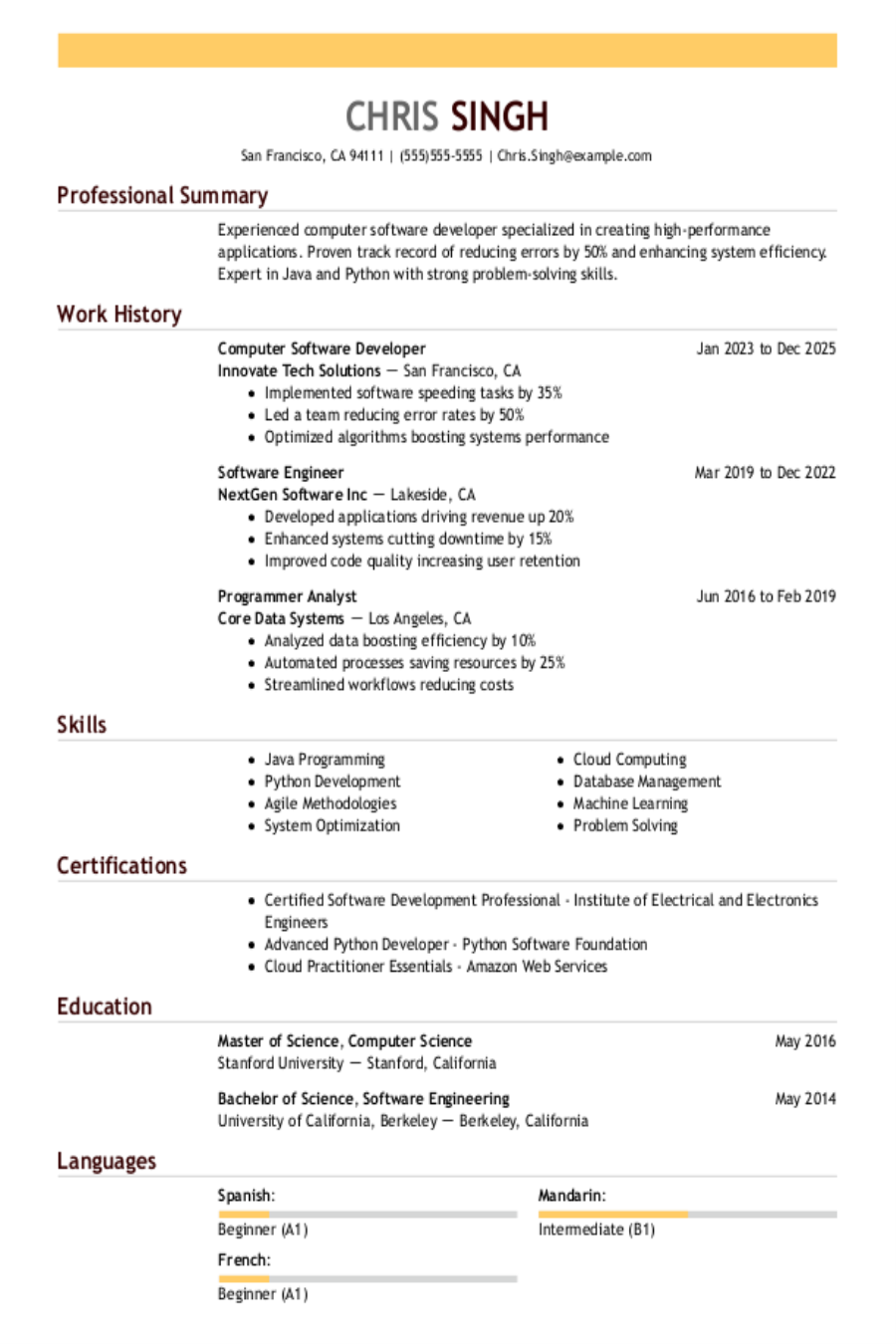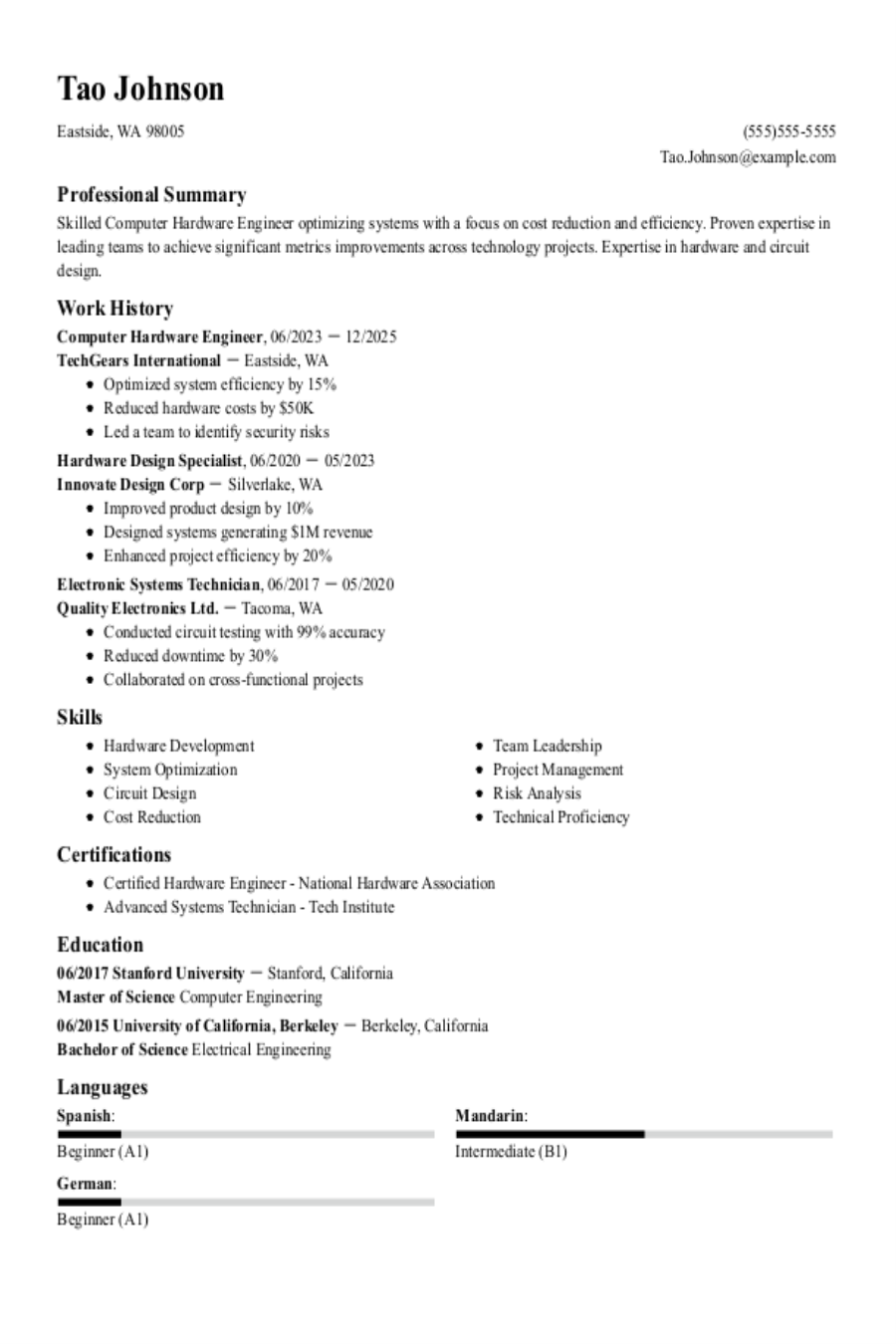Popular Security Supervisor Resume Examples
Entry-level security supervisor resume
An entry-level resume for a security supervisor should highlight relevant training, certifications, leadership skills, and any volunteer or internship experience to show capability and readiness for the role.
Places skills over experience: The functional resume format is a strategic choice for this entry-level security supervisor role because it highlights key skills like crisis management and team leadership, showcasing their direct impact on safety improvements.
Emphasizes soft skills: This resume highlights the applicant’s soft skills, including leadership and crisis management, which effectively compensate for limited experience. For example, their ability to lead a team that improved safety by 30% shows readiness for a security supervisor role.
Mid-career security supervisor resume
A mid-career security supervisor resume should emphasize a combination of leadership experience, technical skills, and ongoing professional development to effectively reflect growth in the security industry.
Employs active language: Using action verbs such as "managed," "reduced," and "implemented" emphasizes a proactive approach to leadership and measurable success in improving security operations.
Balances skills and experience: This job seeker's resume skillfully highlights their technical expertise in security management and demonstrates a clear trajectory of career advancement, showcasing significant achievements that improve their professional profile.
Experienced security supervisor resume
An experienced security supervisor resume should prioritize clear examples of leadership roles, successful team management, and measurable improvements in safety protocols to highlight career accomplishments and growth.
Quantifies achievements: Quantifiable achievements, like reducing incidents by 30% or managing a team of 15, provide clear evidence of a job seeker's impact. These metrics not only highlight success but also make it easier for recruiters to assess qualifications at a glance.
Highlights experience: This resume's opening summary effectively showcases the applicant’s 13 years of experience in security and risk management.
No experience security supervisor resume
A resume for an applicant with no experience as a security supervisor should highlight relevant skills, certifications, and any volunteer work or internships that showcase the job seeker's capability to manage safety effectively.
Overcomes lacking experience: Including volunteer work and extracurricular activities highlights leadership and practical skills, improving a resume for job seekers with limited professional experience in security roles.
Emphasizes professional skills: Emphasizing crisis management and communication skills highlights the job seeker's readiness for a security supervisor role, showcasing their ability to ensure safety despite limited experience.
More resume examples
Security Supervisor Resume Template
Looking to craft an impressive application? Start with this security supervisor resume template, which you can easily personalize by adding your unique qualifications and experiences.
Hiro Patel
Eastside, WA 98013
(555)555-5555
Hiro.Patel@example.com
Professional Summary
Security Supervisor with 8 years' experience. Expert in risk assessment, team leadership, and cost optimization, enhancing security protocols by 30%.
Work History
Security Supervisor
SecureTech Solutions - Eastside, WA
January 2022 - October 2025
- Improved security protocols by 30%
- Led a team of 15 security officers
- Implemented cost-saving measures worth $50K
Security Team Lead
Guardian Facilities - Tacoma, WA
January 2018 - December 2021
- Optimized patrol operations by 15%
- Trained security staff in emergency protocols
- Enhanced CCTV coverage for 45% area increase
Security Officer
Shielded Security Co. - Eastside, WA
January 2017 - December 2017
- Conducted safety audits with 95% accuracy
- Reduced incident reports by 22%
- Provided customer service for escalations
Skills
- Security protocol enhancement
- Team leadership
- CCTV operations
- Emergency response
- Risk assessment
- Report analysis
- Customer service
- Cost optimization
Education
Master of Science Security Management
University of Texas at Austin Austin, Texas
December 2016
Bachelor of Arts Criminal Justice
Texas State University San Marcos, Texas
December 2014
Certifications
- Certified Protection Professional (CPP) - ASIS International
- Security Leadership Certification - Security Management Institute
Languages
- Spanish - Beginner (A1)
- French - Intermediate (B1)
- German - Beginner (A1)
Must-Have Skills on a Security Supervisor Resume
A strong skills section is important for showcasing your qualifications and attracting potential employers.
The following data highlights the most sought-after hard and soft skills for a security supervisor resume according to Resume Now’s internal resume data.
When you’re ready to improve your resume with relevant skills, check out our AI Resume Skills Generator. It provides tailored suggestions based on your job title, ensuring you build a comprehensive and effective skill set.
Writing Your Security Supervisor Resume
Having explored these compelling resume examples, you're now prepared to dive into the process of writing your own resume. We'll guide you through each section step by step, ensuring you understand how to write a resume that stands out.
List your most relevant skills
An effective skills section on your security supervisor resume highlights both technical skills, such as risk assessment and incident response, along with essential soft skills like leadership and communication. Remember, this section is your chance to demonstrate how you align with the role of a security supervisor.
To make your resume stand out, carefully review the job listing and incorporate relevant keywords from the job listing. Using terms like "team management," "surveillance systems," and "emergency response" not only resonates with human recruiters but also helps you get past applicant tracking systems (ATS).
Example of skills on a security supervisor resume
- Proficient in implementing security protocols to safeguard personnel and property
- Adept at conducting thorough investigations and reporting incidents
- Strong communicator with a focus on team collaboration
- Vigilant observer with keen attention to detail in monitoring security operations
A strong skills section is important for demonstrating your readiness for the security supervisor position. It should combine the technical skills specified in the job description with essential soft skills, showcasing your ability to effectively manage a team and handle challenges. This balance indicates that you are fully prepared to meet the demands of the role.
Highlight your work history
Your work experience section should emphasize your achievements and illustrate how you’ve applied your key skills in various situations. Each entry must highlight significant accomplishments, showcasing your ability to manage teams, handle emergencies, and implement security protocols effectively.
Each job entry needs to include essential details: your title, employer's name, and dates of employment. This information helps establish credibility and provides employers a quick overview of your professional timeline. Focus on specific achievements that demonstrate leadership capabilities and contributions to improving safety measures.
Example of a security supervisor work experience entry
- Security Supervisor
XYZ Security Solutions - Dallas, TX
January 2021 - Present - Oversee a team of 15 security personnel to ensure the safety and security of over 500 facility employees and visitors daily
- Conduct regular safety audits and risk assessments, leading to a 30% reduction in security incidents over two years
- Develop and implement training programs for new hires on emergency response protocols and surveillance techniques, improving team readiness by 25%
- Collaborate with law enforcement and emergency services to establish effective communication channels, improving incident response time by 40%
- Use advanced surveillance technology to monitor premises, resulting in the successful identification and resolution of multiple theft incidents
Highlighting outcomes and achievements in your experience section is key to making a lasting impression on employers. By showcasing specific results, you demonstrate your effectiveness and ability to contribute positively to the organization. This not only differentiates you from others but also provides concrete evidence of your skills in action, making your application more compelling.
Include your education
The education section of your security supervisor resume should list your academic credentials in reverse-chronological order, starting with your most recent degree. Include relevant diplomas and certifications while omitting your high school diploma if you've earned higher qualifications.
If you are currently enrolled in a program or have incomplete education, it is important to indicate your highest completed level along with an expected graduation date. You can also include bullet points that detail essential coursework or relevant achievements during your studies.
Common certifications for a security supervisor resume
- Certified Protection Professional (CPP) – ASIS International
- Physical Security Professional (PSP) – ASIS International
- Professional Certified Investigator (PCI) – ASIS International
- Certification in Risk Management Assurance (CRMA) – The Institute of Internal Auditors (IIA)
Sum up your resume with an introduction
Your profile section is your chance to make a strong first impression on potential employers. It's the opening statement that sets the tone for your entire resume, giving recruiters insight into who you are professionally and what you bring to the table.
For seasoned professionals in security supervision, a professional summary is ideal. This format allows you to showcase your significant achievements and expertise right at the top of your resume. If you’re lacking extensive experience, write a resume objective that shows your focus on career advancement.
Professional summary example
Dedicated security supervisor with over 10 years of experience in managing security operations across various sectors. Proven ability to improve safety protocols, reduce incident response times, and lead high-performing teams. Expertise in risk assessment, crisis management, and fostering a culture of vigilance ensures a secure environment for all stakeholders.
Resume objective example
Enthusiastic security supervisor aiming to use strong attention to detail and effective communication skills to improve safety protocols at a forward-thinking organization. Eager to contribute by implementing efficient security measures and fostering a secure environment for both employees and clients.
For a security supervisor position, your resume profile plays a key role in showcasing your skills. Start by reviewing job descriptions to identify essential keywords related to security management and risk assessment. Incorporating these terms into your summary will improve its visibility in ATS, increasing your chances of being noticed by hiring managers.
Add unique sections to set you apart
Optional resume sections are a great way for you to highlight your unique qualifications as a security supervisor. These sections allow you to present additional information that can set you apart from other applicants.
By including relevant hobbies or volunteer work, you showcase not only your professional skills but also your personal values and interests. This gives potential employers insight into how you engage with the community and develop important competencies outside of work. It’s an excellent opportunity to demonstrate qualities such as teamwork, leadership, and dedication—attributes that are essential in security roles.
Three sections perfect for a security supervisor resume
- Languages: As a security supervisor, effective communication is important for conflict resolution and team coordination. Highlighting your language skills on your resume can improve your ability to connect with diverse staff and clients, improving overall safety.
- Volunteer Work: Including volunteer work on a resume not only showcases your dedication to community service but also highlights valuable skills that improve your professional profile. It reflects your commitment and can set you apart from other job seekers.
- Accomplishments: As a security supervisor, measurable results are vital to demonstrate the effectiveness of your team's performance. Emphasize these achievements within your work history or by crafting a dedicated accomplishments section.
5 Resume Formatting Tips
- Choose a format that matches your career stage.
Choosing the right resume format is essential for showcasing your experience. If you have extensive experience, a chronological format highlights your career progression effectively. For those with limited experience, a functional format can emphasize skills over job history. Consider a combination format if you want to present both skills and work history clearly.
- Pick a smart resume template.
Ensure your resume is clear and professional by using a quality resume template. This approach helps recruiters quickly grasp your qualifications and ensures easy readability. Opt for simple, ATS-friendly fonts to improve your resume's presentation.
- Select an appropriate font.
Choose a clean and professional font to improve your resume's readability. Fonts such as Helvetica, Georgia, or Verdana are excellent choices that attract both applicant tracking systems and hiring managers.
- Use consistent formatting.
Align your resume text to the left and set uniform margins. This creates a clean, organized look that improves readability and makes a strong professional impression.
- Keep your resume to one or two pages.
When outlining your resume, remember that resumes should be one page long in most cases. Keep your content concise and focused on the key experiences and skills that showcase your qualifications effectively.
Tools for Your Job Search
Are you ready to elevate your career as a security supervisor? Before you submit your application for that exciting position, consider using our ATS Resume Checker. This essential tool provides insights into how your resume performs with the automated systems many employers use to screen job seekers, ensuring you stand out from the competition.
Want to create a standout resume? Our AI Resume Builder offers tailored content recommendations specifically designed for your background in security supervision, along with professional templates that showcase your skills and experiences effectively.
Frequently Asked Questions
Last Updated: November 6, 2025
Absolutely. A cover letter is important as it provides additional context to your resume and establishes a direct line of communication with employers. It’s your opportunity to explain what draws you to the role and demonstrate how your experience makes you the ideal applicant. So, take the time to write a cover letter that improves your application.
For a quick and effective solution, check out our AI Cover Letter Generator. It allows you to create a tailored cover letter in just minutes! Plus, you can choose from various cover letter template options that perfectly match your resume, ensuring a polished presentation of your qualifications.
A resume is typically concise, spanning one to two pages, while a curriculum vitae (CV) can extend several pages and includes detailed information about your academic background, research contributions, publications, and professional experiences. This level of detail makes CVs suitable for roles that require a comprehensive overview of your qualifications.
You’ll often need a CV for specialized positions in fields like academia, law, or medicine. If you find yourself in such a situation, our online CV Maker can assist you in crafting an impressive document quickly. Choose from various tailored CV templates designed for different industries and career levels to get started on making your application stand out.
Choosing the right resume format hinges on your career level and strengths. For those just starting out, a functional format highlights skills over experience, making it ideal for inexperienced job seekers. Conversely, seasoned professionals should opt for a chronological format to showcase their work history effectively. Mid-level job seekers often find that a combination format strikes the perfect balance between skills and experience, allowing them to present a well-rounded profile to potential employers.
To excel as a security supervisor, actively pursue training and certifications that improve your skills. Engage with professional networks, subscribe to industry publications, and take part in relevant online courses. Staying informed about trends will position you as a leader in your field.
Was this information helpful? Let us know!
Keith is a Certified Professional Resume Writer (CPRW) and trusted media source in the career industry with over a decade of experience helping job seekers stand out.
More resources

How to Write a Resume for an Internal Position (Guide + Examples)
Ready for a new role within the same company? We ll help you...

The Great Workplace Reckoning: How 2025 Burned Out Workers & What’s Next for 2026
The workforce spent much of 2025 in survival mode navigating ...

What Is a CV? Curriculum Vitae Definition & Who Should Have One
Do you need to know what a CV stands for? We share the definit...

Billing Resume: Examples & Templates
As a billing professional you need a resume that captures the...

Computer Software Resume: Examples & Templates
As a computer software professional your resume should showca...

Computer Hardware Resume: Examples & Templates
As a computer hardware professional you need a resume that sh...

